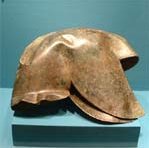
May be one of the most important archeological sites of the last 50
years, in a riverbed in Croatia
The following article appears in the January 14, 2004 edition of
http://icbirmingham.icnetwork.co.uk/ which is a web site run by a
consortium of newspapers based in Birmingham, UK. John Kraljic
Ancient Archeological Finds in the Cetina River Valley
Historic find is pure gold! Jan 14 2004
By Tony Collins
City archaeologists have struck gold - with a major Bronze Age discovery
in eastern Europe.
A team of experts from the University of Birmingham has discovered what
may be one of the most important archaeological sites of the last 50
years, in a riverbed in Croatia.
Items recovered from the river include more than 90 swords, a Roman
legionnaire's dagger complete with sheath, more than 30 Greco-Illyrian
helmets, plus numerous items of jewellery, axes and spearheads.
It is believed a large number of objects were thrown into River Cetina
deliberately, possibly as offerings to gods.
Initial surveys of the site indicate that the remarkable finds span a
period of history from 6,000 BC onwards.
These include 33m long timbers, clearly visible from the riverbank,
which show evidence of late Neolithic or early Bronze Age wooden
settlements.
Project leader Dr Vincent Gaffney, director of the university's
Institute for Archaeology and Antiquity, described the find as a "once
in a lifetime discovery" for any archaeologist.
He said: "The Cetina Valley is certainly the most remarkable site that I
have, and will ever, have the privilege of being involved in.
"As the majority of the Cetina Valley site is waterlogged, the level of
preservation is quite exceptional. I believe this to be one of the most
important archaeological wetlands in Europe."
Sediments in the river valley also provide an environmental record
covering around 10,000 years, offering an insight into the everyday life
of the people who would have lived there.
The Birmingham University team is to return to the site in May to carry
out an extensive survey.

May be one of the most important archeological sites of the last 50
years, in a riverbed in Croatia
The following article appears in the January 14, 2004 edition of
http://icbirmingham.icnetwork.co.uk/ which is a web site run by a
consortium of newspapers based in Birmingham, UK. John Kraljic
Ancient Archeological Finds in the Cetina River Valley
Historic find is pure gold! Jan 14 2004
By Tony Collins
City archaeologists have struck gold - with a major Bronze Age discovery
in eastern Europe.
A team of experts from the University of Birmingham has discovered what
may be one of the most important archaeological sites of the last 50
years, in a riverbed in Croatia.
Items recovered from the river include more than 90 swords, a Roman
legionnaire's dagger complete with sheath, more than 30 Greco-Illyrian
helmets, plus numerous items of jewellery, axes and spearheads.
It is believed a large number of objects were thrown into River Cetina
deliberately, possibly as offerings to gods.
Initial surveys of the site indicate that the remarkable finds span a
period of history from 6,000 BC onwards.
These include 33m long timbers, clearly visible from the riverbank,
which show evidence of late Neolithic or early Bronze Age wooden
settlements.
Project leader Dr Vincent Gaffney, director of the university's
Institute for Archaeology and Antiquity, described the find as a "once
in a lifetime discovery" for any archaeologist.
He said: "The Cetina Valley is certainly the most remarkable site that I
have, and will ever, have the privilege of being involved in.
"As the majority of the Cetina Valley site is waterlogged, the level of
preservation is quite exceptional. I believe this to be one of the most
important archaeological wetlands in Europe."
Sediments in the river valley also provide an environmental record
covering around 10,000 years, offering an insight into the everyday life
of the people who would have lived there.
The Birmingham University team is to return to the site in May to carry
out an extensive survey.